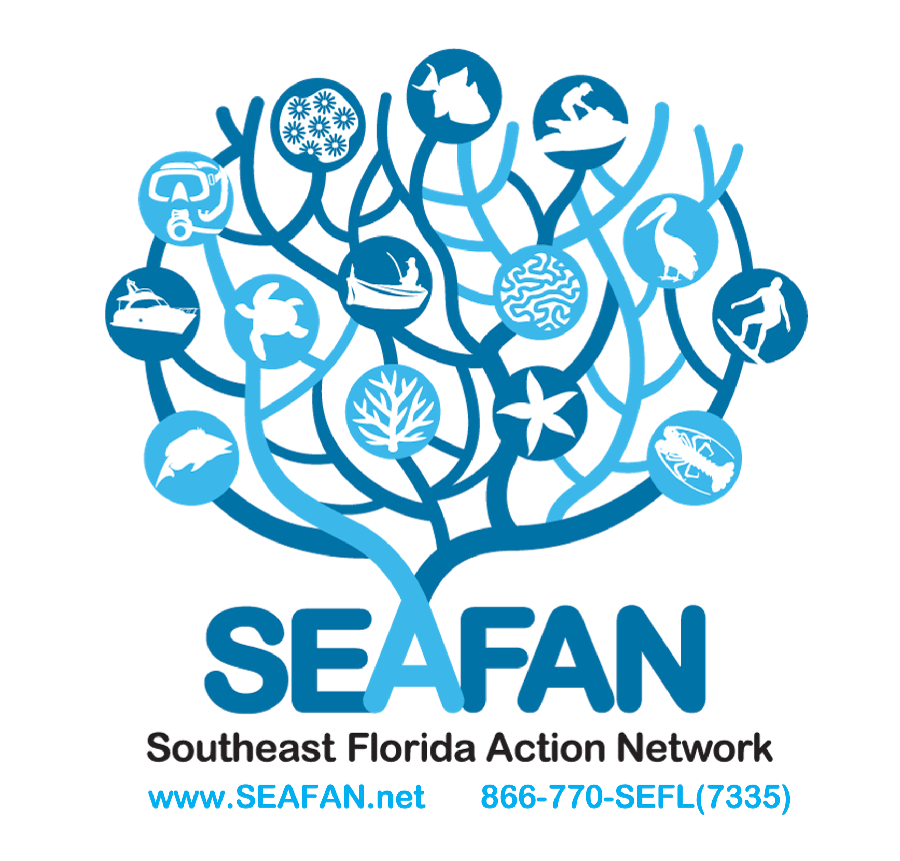Report a Marine Incident! | Have you taken a BleachWatch Training? | Have you seen a tagged coral? |
|---|
Call the SEAFAN hotline at 866-770-SEFL (7335) or Submit a Report Online | If you are a trained BleachWatch observer Submit a BleachWatch Report to detect and monitor coral bleaching and disease in Southeast Florida. | Divers and snorkelers in Southeast Florida and the Keys can assist in monitoring the effectiveness of experimental treatments on diseased corals. Submit a report to the Citizen Science Photo Submission Form. |
SEAFAN - The Southeast Florida Action Network
The Southeast Florida Action Network (SEAFAN) is a citizen reporting and response system designed to improve the protection and management of Southeast Florida's offshore coral reefs by enhancing marine debris cleanup efforts, increasing response to vessel groundings and anchor damage, and providing early detection of potentially harmful biological disturbances.
What Areas Are Covered?
SEAFAN covers the offshore coral reefs within the northern third of Florida's Coral Reef, from the northern border of Biscayne National Park in Miami-Dade County to the St. Lucie Inlet in Martin County. This region is known as the Kristin Jacobs Coral Reef Ecosystem Conservation Area (Coral ECA). Marine incidents in the Florida Keys also can be reported to SEAFAN.
You also can check and report beach conditions (weather and surf conditions, tides, crowds, debris, drift algae, jellyfish and more) on Mote Marine Laboratory & Aquarium’s Beach Conditions Reporting System (BCRS) at VisitBeaches.org or on the BCRS – Mote Marine Laboratory mobile app.
What Should Be Reported?
Report any unusual sightings, including marine debris; vessel groundings and anchor damage; invasive species; harmful algal blooms; fish disease and fish kills; discolored water; and coral disease and bleaching. There is no special training needed and no further participation is required; just report what, when and where the incident was observed.
For more information on the current coral disease affecting our local reefs, visit our dedicated disease page.
Who's Involved?
The network is composed of people who spend time on the water, such as divers, snorkelers, commercial and recreational anglers, boaters, law enforcement personnel, environmental professionals, and anyone else who uses the water or visits the coast. Everyone can contribute to the network.
How Does it Work?
SEAFAN acts as an umbrella program. There are three separate programs that fall under SEAFAN, each of which is designed to reduce a unique threat to Southeast Florida's coral reefs: Marine Debris Reporting and Removal Program; BleachWatch Program; and Reef Injury Prevention and Response Program (RIPR).
All reports received through the telephone hotline or online form are logged into a comprehensive marine incident database and evaluated. When appropriate, a response is coordinated based on the type of report:
- Marine debris reports are used to coordinate future cleanup efforts. Large debris is targeted for future removal by experienced personnel, while sites that tend to accumulate smaller debris are identified for volunteer-based reef cleanup events.
- If necessary, vessel grounding or anchor damage reports are followed by a site assessment to determine the presence and extent of reef injuries. Response efforts include outreach to the responsible parties in order to reduce the likelihood of a repeat occurrence and, in some cases, mitigation activities to restore the damaged or lost resources.
- Reports of possible biological events (e.g., fish disease and fish kills; harmful algal blooms; coral disease and bleaching; invasive species; discolored water) are tracked to determine the spatial extent and duration of the incident. DEP staff distributes information and coordinates with regional partners to schedule initial site assessments and implement response protocols when necessary.
SEAFAN Newsletters
Check out the new SEAFAN flyer, which you can download, print and share at your convenience.
For more information or to schedule an informational class, please email Lara.Bracci@FloridaDEP.gov.



